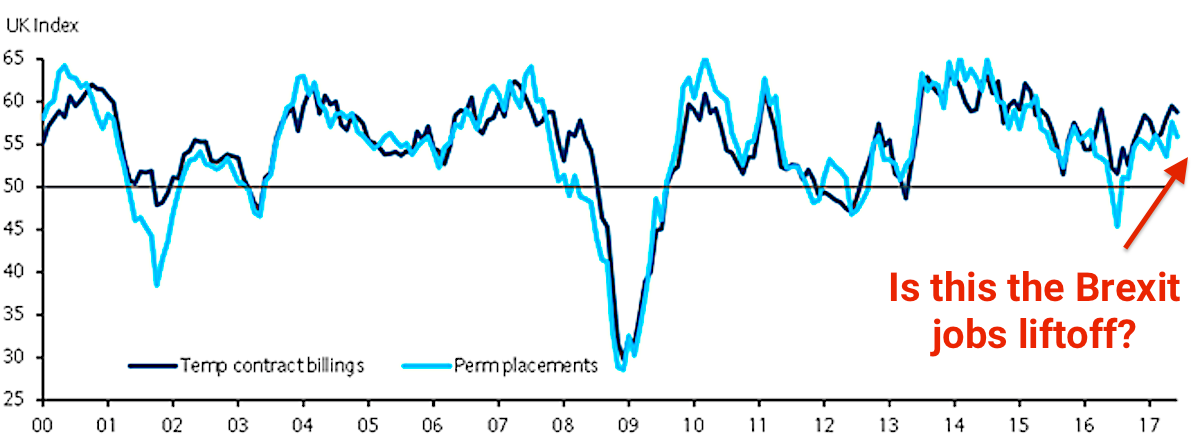LONDON — Total job vacancies grew in June as the number of available workers shrank due to EU citizens leaving the UK, according to Barclays analyst Paul Checketts and his team. That pushed up salaries in the UK at the sharpest rate of increase since November 2015, the bank said.
If you are looking for evidence that Brexit will have a beneficial effect on the jobs market, you’re going to like this chart: Barclays
Barclays
Don’t get too excited. It takes more than a month or two of data to override a years-long underlying trend. Job creation is still not as strong as it was in 2014, for instance. Overall economic growth remains modest and “dampened” due to uncertainty over Brexit, Barclays said. The bank drew its data from a Markit survey of recruitment agencies.
However, one big part of the Brexit argument could be starting to come true: As the UK becomes a less welcoming place for foreign workers there are fewer workers competing for each job opening. And that is pushing wages up, a little bit.
The Barclays team wrote in a note to clients:
“Growth was reportedly dampened by risk aversion linked to Brexit uncertainty and the general election. The pool of available candidates continued to shrink markedly in the month, however, which is thought to be due to EU citizens leaving the UK. The combination of increased demand for labour and fewer people looking for jobs is reported as putting sharp upward pressure on salaries.”
“Demand for both temps and perms remains high with vacancies continuing to rise in June, with the Vacancy Index at 63.0 in June, down slightly from 63.3 in May, 62.2 in April and significantly above the 50 level which marks an expansion.”
It’s a rare piece of good news for British workers. The post-2008 crisis period has been marked by stagnant wages, as employers created low-paying jobs in the gig economy instead of investing in the kinds of high-wage, high-productivity employment economists hope for.
Members of the Bank of England’s Monetary Policy Committee have publicly worried that the economy — which is technically at full employment — has failed to increase wages. MPC member Andy Haldane told the Guardian: “Adjusting for inflation, most people’s pay is probably falling rather than going up.”
And while the June data is not on its own proof that reducing the supply of immigrant workers will automatically increase wages for the remaining British ones, it’s the kind of stat you’d hope to see if you believed that was the case.
Here is Barclays again:
“Permanent salaries increase for sixty-second month running. June data signalled 60.1, the sharpest rate of increase since November 2015 and an improvement on the 59.5 in May following 57.4 in April and 59.0 in March. The higher salaries are attributed to the continued competition for candidates with scarce skills alongside greater efforts to secure quality candidates.”
All regions of the UK saw pay growth, with the sharpest increases in the North. At the same time, all regions saw a decline in available candidates, especially in the South.
The Office for National Statistics (ONS) is set to release wage growth and unemployment data for May on Wednesday this week. The stats could make for interesting reading in light of Barclays’ note.













